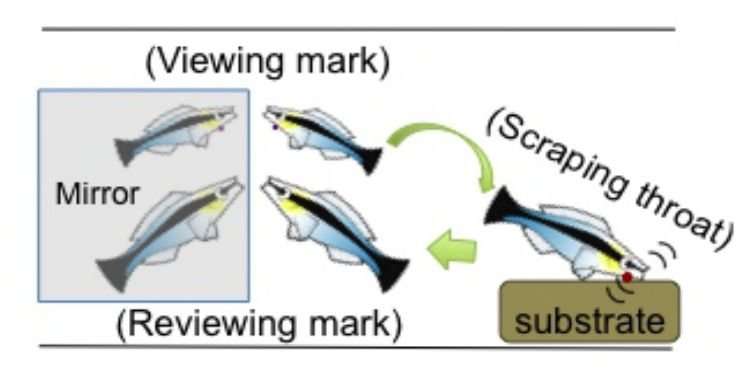September 4, 2018 report
Small fish passes classic self-awareness test

An international team of researchers has found a small tropical fish that is capable of passing a classic test of self-awareness. The results are published on the bioRxiv prepress server.
Since the 1970s, a test developed by Gordon Gallup has been the gold standard for testing for self-awareness—researchers make a mark on a creature's face and introduce a mirror. If the animal makes some attempt to touch or remove the mark, they are deemed to have self-awareness. Since the test first came into use, only a few animals have ever passed the test. Besides humans, the list currently includes chimpanzees, bonobos, orangutans, dolphins, elephants and pigeons. Others have responded in ways that have left their results in dispute. In this new effort, the researchers tested the relatively unknown cleaner wrasse—a tiny tropical fish. Prior research has shown that they have very good eyesight and go after parasites on the bodies of other fish. They are also very territorial.
To test the fish, the researchers first placed specimens in a fish tank with a mirror and watched what happened. As expected, the fish behaved as if viewing encroachments on their territory—they tried to attack their reflections. After giving the fish time to get used to the mirror, the researchers found they began exhibiting abnormal behavior—they bobbed as if watching themselves dance. Next, the team used a gel to mark the foreheads of the test fish—marks that the fish could only see when they looked in the mirror. The researchers report that some of the test fish spent more time looking at their reflection, and that some of them actually tried scraping their face in the location of the gel, as if trying to remove it. The researchers claim this behavior indicates the fish passed the self-awareness test—they saw the mark on their forehead and tried to touch it in the only way available to them.
More tests will have to be done by others to prove the behavior was as it appeared and not just an attempt by the fish to grab and eat what they perceived as a parasite affixed to the head of a nearby fish.
More information: Masanori Kohda et al. Cleaner wrasse pass the mark test. What are the implications for consciousness and self-awareness testing in animals?, bioRxiv (2018). DOI: 10.1101/397067
Abstract
The ability to perceive and recognise a reflected mirror image as self (mirror self-recognition, MSR) is considered a hallmark of cognition across species. Although MSR has been reported in mammals and birds, it is not known to occur in any other major taxon. A factor potentially limiting the ability to test for MSR is that the established assay for MSR, the mark test, shows an interpretation bias towards animals with the dexterity (or limbs) required to touch a mark. Here, we show that the cleaner wrasse fish, Labroides dimidiatus, passes through all phases of the mark test: (i) social reactions towards the reflection, (ii) repeated idiosyncratic behaviours towards the mirror (contingency testing), and (iii) frequent observation of their reflection. When subsequently provided with a coloured tag, individuals attempt to remove the mark in the presence of a mirror but show no response towards transparent marks, or to coloured marks in the absence of a mirror. This remarkable finding presents a challenge to our interpretation of the mark test – do we accept that these behavioural responses in the mark test, which are taken as evidence of self-recognition in other species, mean that fish are self-aware? Or do we conclude that these behavioural patterns have a basis in a cognitive process other than self-recognition? If the former, what does this mean for our understanding of animal intelligence? If the latter, what does this mean for our application and interpretation of the mark test as a metric for animal cognitive abilities?
© 2018 Phys.org

















